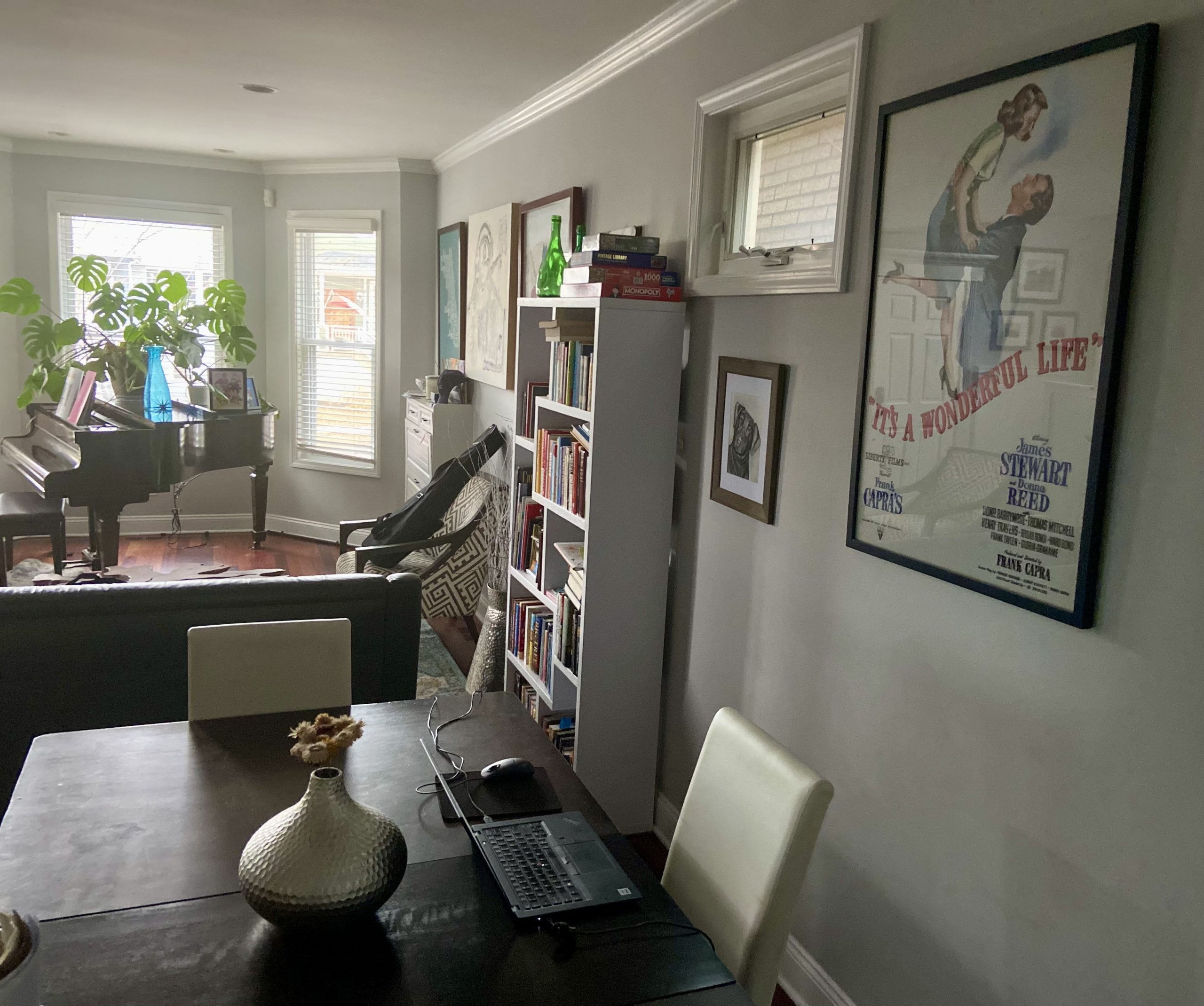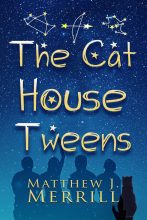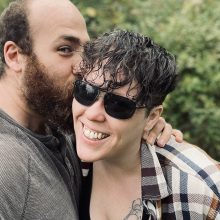The Cat House Tweens by Matthew J. Merrill
What led you into writing?
For as long as I can remember, I have been a writer. It has been a comfort zone/de-stressor/creative outlet since a young age. Writing is about unleashing my voice. Even when my writing doesn’t meet my own standards, or technical prowess, it is a way for me to express myself in a confident and authentic way. I compare my writing a lot to my marathon running. It’s one paragraph (one mile) at a time. It’s about experiencing the highs and lows, learning from both, but ultimately to keep moving forward and making progress. It’s about realizing strength, potential, and positive energy. It’s about resilience. It’s about celebration of life. It’s about understanding myself and the world better. So why wouldn’t I run marathons? Why wouldn’t I write?
In my book’s acknowledgement section, I express gratitude for my wife’s support, for my kids serving as muses, and to my school English, Band, and Theatre teachers for encouraging my involvement in, and passion for, the arts and writing. The arts are essential. I wish all kids could have the same encouragement I did to express themselves through writing and the arts.
How does a typical day look?
For my “day job,” I am fortunate to work for an amazing organization with an amazing mission, Chicago Children’s Theatre. I am the Director of Development, leading external relations and fundraising efforts, so it is a lot of grant writing and telling the story of the organization to different publics to grow support. In addition to writing grants, I handle Board recruitment/stewardship, plan and execute special events, and manage donor relations. I wear a lot of hats, and every day is something different and creative. Chicago Children’s Theatre places a big emphasis on providing access to high quality theatrical experiences to underserved, under-represented, and marginalized communities, including low income families and youth with special needs. It is extremely rewarding to know that a grant that I secured, or a major gift I solicited, results in a child’s exposure to the arts, who otherwise would not have the means or ability to experience our programming. I love to sit in the theatre and watch the audience’s reaction to our shows. My kids also love that I work for Chicago Children’s Theatre, so it’s amazing to know I have a job that makes them proud.
As for the typical routine, it’s wake up and get the kids to school. Do some work, go for a run, get some writing in, get some more work done, get the kids home from school, help with homework, make dinner, wind down with a family TV show together, read/write, bedtime.
In what ways do your characters test your abilities?
Writing teenage characters tests my ability to speak in young people’s voices. I like to make pop culture references, but I have to work hard not to sound dated in those references. I also try very hard to create stock characters that are relatable, but that are also original and fully-dimensional. In terms of my main characters, I often get asked if the central character is a young version of myself and if the book is really a memoir. The truth is that no single character represents me, and none of the events are retellings of my childhood experiences. Some may be based on real life events or people, but they are not replicas of memories. In other words, any resemblance to real life people or events is coincidental. Everyone knows the phrase, right?! Instead, I challenged myself to include different shades of my personality into each of my lead characters. It’s fun for me to read my book, and reflect on how each of the characters represent myself, both positive and negative.
What’s your setup?
I write at home (a neighborhood in north Chicago) in our cozy front room space. I’ll often have a glass of wine or a drink while I write in the evening. I love that I have the front windows, with a baby grand piano in the nook to look at, the dogs sleeping at my feet, and a poster from the movie, “It’s A Wonderful Life,” a sketch my niece drew of our late dog, Charley, and our bookcase flanking my shoulders behind me.

What lasting effects have your favourite authors had on your writing and style?
As I noted, my writing style is dialogue-focused, with lots of back and forth banter between characters, along with introspection where characters will be talking/thinking to themselves. I am a big fan of many young adult, and other fiction genre authors who, in my opinion, write in this style: Jack Gantos, Sherman Alexie, Kwame Alexander, Angeline Boulley, Stephen Graham Jones, Christopher Paul Curtis, Emily St. John Mandel, Graeme Simsion.
While my writing is not “heavy” in the following styles- I try to pull from the whimsey of authors like J.K. Rowling and Brian Selznick; the strength and impact of authors like Langston Hughes, Harper Lee, and Ta-Nehisi Coates; and the rich language and imagery of authors like Charles Dickens, Betty Smith, Haruki Murakami, and Shakespeare.
Note: I realize that this list contains some names (not all or the majority by any means) whose image/legacy has been tainted or made controversial by personal stances or decisions, and I am in no way endorsing or affirming these aspects of their character(s).
What do you do for inspiration?
-Run! The endorphins released spur so much creativity, and running long distances is such a great metaphor for life (as i described in the question about what led me into writing). I learn something new about myself after every long run.
-Watch sports with a beverage and buffalo wings. Yes, it’s inspiring!
-Read and write.
-Watch theatre and movies.
-Listen to music, all types but I find musicals to be particularly inspirational.
-Spend time with my family. I find it particularly inspiring to listen to live music, or be at the ocean with my family.
What repeating themes do you find yourself pulling into your stories?
Small town nostalgia, teen angst, the optimism and leadership of youth, diversity and attitudes toward “the other,” urban/rural culture divide, local legends and ghost stories
How do you wind down?
The same things I find inspirational are also things that I use to wind down. Maybe that’s why I have so much trouble winding down?! I will add for good measure, my newest source of winding down- electronic compression boots! So good to keep the blood circulating and to relax- like paying for a good massage.
-Run! It’s good for winding up and winding down!
-Watch sports with a beverage and buffalo wings.
-Read and write.
-Listen to music, all types but I find musicals to be particularly inspirational and relaxing! I like to sit in the dark or by the fireplace with a beverage and listen to music.
-Watch theatre and movies.
-Spend time with my family. I find it particularly inspiring/relaxing to listen to live music, or be at the ocean with my family.
What sort of challenges do you regularly overcome while designing your world/setting?
My setting for this book, a small, rural Midwestern town, is by definition not diverse in terms of race/ethnicity, or even in perceived gender and sexual orientation identities. But I wanted to include diversity as a core theme. The ways I overcame this challenge: 1) Having characters discuss diverse communities and individuals, 2) exposing how the absence of diversity can result in insensitive and even discriminatory jokes and language, and 3) introducing “the other” to represent diversity in less traditional ways- in the case of this book, I included individuals experiencing homelessness and “ageism” to explore attitudes toward “the other” aka diversity.
What are you reading at the moment?
I am really into Social Horror right now. I just finished The Indian Lake Trilogy with The Angel of Indian Lake by Stephen Graham Jones, and started Lakewood by Megan Giddings. In Young Adult Literature land, I recently finished Warrior Girl Unearthed by Angeline Boulley (her follow up to Firekeeper’s Daughter), and would HIGHLY RECOMMEND!
What’s the most useful advice you could give to an aspiring author?
Just write. Be confident in finding your voice. Don’t get discouraged when you have doubts, receive negative feedback, or feel like your writing doesn’t measure up. Just write. You will find your voice. Write what you know. Your voice, your perspective, and your writing is important.
If you have success measures and goals tied to your writing (awards, being published, books sold or size of audience), be prepared to do research, take advice, and do the hard work necessary. Just as finding your voice may not be easy, completing projects and attaining success as a writer requires hard work, and even with that, there are no guarantees. But remember to keep writing, and to know the intrinsic value in that.
Tell us about the book you’re promoting.
The book’s preface best sums it up! I began writing The Cat House Tweens before the 2016 U.S. Presidential Election. It speaks to a simpler time before the world felt consumed by vitriol and seemingly irreconcilable differences. I hope readers feel excited about returning to that time, if only through a story. More about that later.
The impetus for the book came from my children, Harper and Cooper. Their experiences growing up are in stark contrast to mine. They are city kids. They have known from early on what it is to be swallowed by the masses, to travel on the L, to look up from a jungle gym planted on artificial turf and see the concrete jungle above and surrounding them, to experience racial and cultural diversity every day, to visit world-class museums and theaters minutes from their home.
But they will likely not experience the culture of a small town, like the one I grew up in Burnett/Horicon, Wisconsin. They will not know the excitement of Friday night high school football lights, the comfort of late summer festivals with fish fries and boils, the camaraderie of sitting around a fire pit or bonfire in the middle of a cornfield, the entertainment that comes from creating town legends and ghost stories. I wrote this book to share these core memories with them, to help them understand and appreciate the person I have become, and to appreciate life in small towns.
One thing I would like to state from the get-go is that this book is not anti-small-town America. Some of the issues I include are social problems facing society and are not isolated to small-town culture. Though it may be true that problems take on a distinct feel in small towns. As such, the book is not intended to be entirely positive. We are facing steep challenges, some of the most immense ones stem from our inability to reflect on problems and differences without resorting to contempt and name-calling. While I wrote The Cat House Tweens for my kids, the universal wish is that it can help us all better understand and support each other.
Living in a big city is amazing. The issues are real, and life is complicated. But the culture is fantastic. The people are strong, giving, and resilient. Living in a small town is amazing. The issues are real, and life is complicated. But the culture is fantastic. The people are strong, giving, and resilient. Whatever choice you make regarding where you live, appreciate the richness, beauty, and benefits of “the other.” Let us focus on what unites us rather than reverting to ugliness and division. Let us use each other’s strengths to build a better society and to raise children who feel empowered to act positively and to see the positive in others.
I would love to hear feedback from those who read The Cat House Tweens, on all of these thoughts and more!
👋 Hi! I run Author Interviews
As a new writer I found myself itching to contribute to a thriving, creative community, so I made Author Interviews and I've met loads of wonderful people in the process. You can buy my debut fantasy RINGLANDER: THE PATH AND THE WAY from Amazon.




